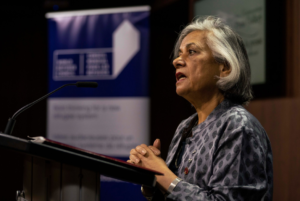Q&A with Canadian Senator Ratna Omidvar: Refugee Women and Girls
 As part of the 16 Days of Activism against Gender-based Violence, the World Refugee & Migration Council (WRMC) talked with Council member and independent Canadian Senator Ratna Omidvar to discuss how the international community can better respond to the needs of refugee women and girls, empower them as agents of change, and confront systemic issues of discrimination.
As part of the 16 Days of Activism against Gender-based Violence, the World Refugee & Migration Council (WRMC) talked with Council member and independent Canadian Senator Ratna Omidvar to discuss how the international community can better respond to the needs of refugee women and girls, empower them as agents of change, and confront systemic issues of discrimination.
WRMC: Refugee women are consistently let down by the international refugee system, where they are marginalized and suffer sexual and gender-based violence and discrimination. What can be done to address these issues?
Senator Omidvar: First, a gender lens needs to be applied to all refugee responses, locally, regionally and internationally. Our multinational responses also need to be filtered through this lens. In this way, we can impact on the services refugee women receive in camps and impact the policies designed at the global level. Second, there needs to be gender training for all refugee actors and the program responses need to be tailored to gender-based realities. Finally, we need to hold corrupt actors, be it leaders or peacekeepers for example, to account when there are acts of gender-based violence.
WRMC: Women and girls are also all too often viewed solely as victims, left out of decision-making processes and leadership opportunities, despite the crucial role they play in keeping their communities and families together through crises. How can this be addressed?
Senator Omidvar: Refugee women and girls need their voices elevated in decision-making rooms across the globe. The Canadian government recently committed to having refugees to be a part of their delegations and that should continue but there needs to be a focus on refugee women’s voices at those tables. Other countries should do the same.
Click here to read the full interview on the World Refugee & Migration Council’s website